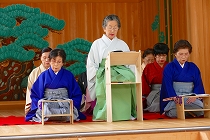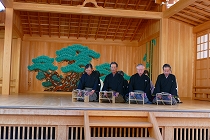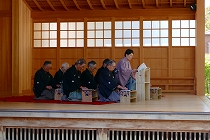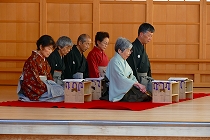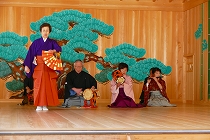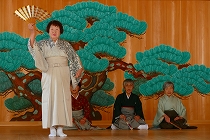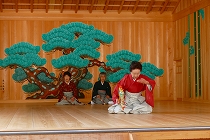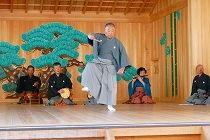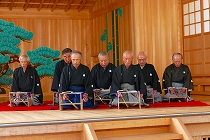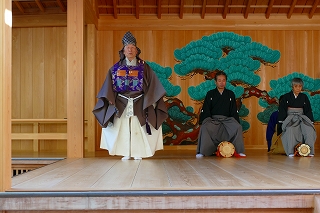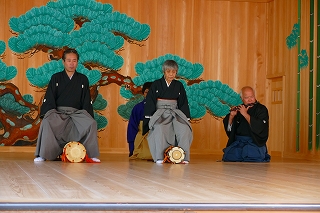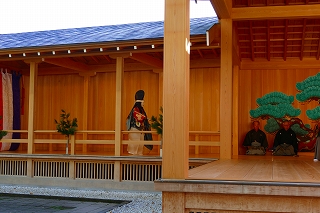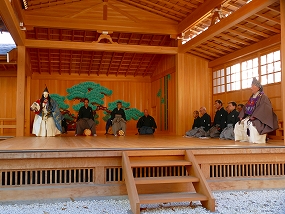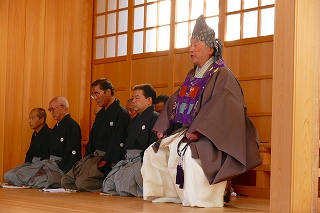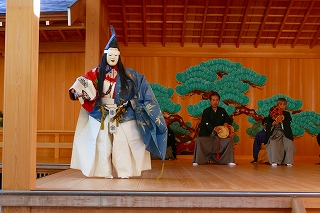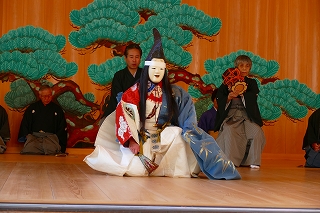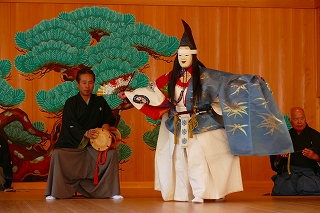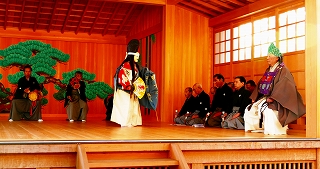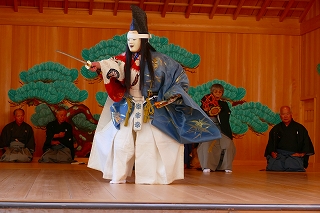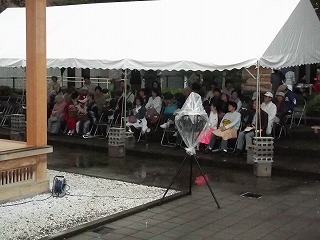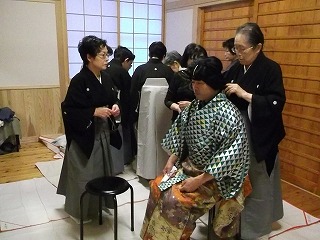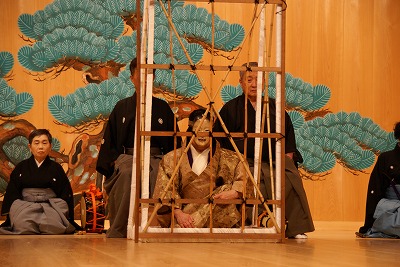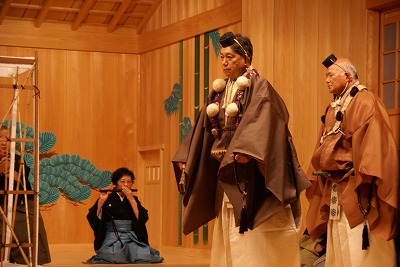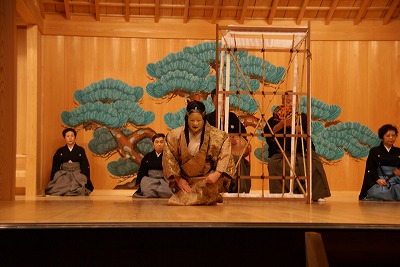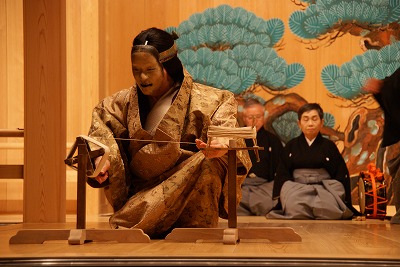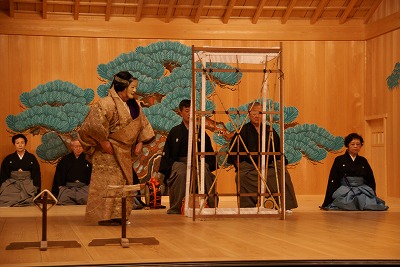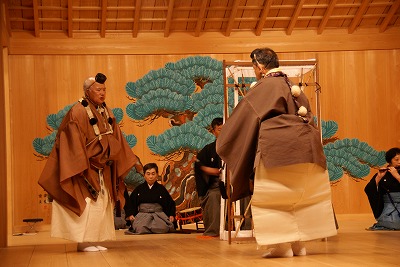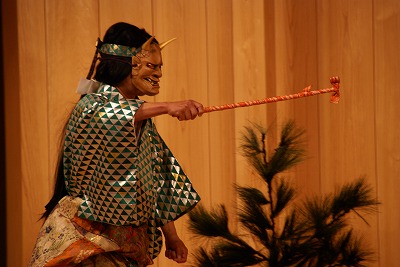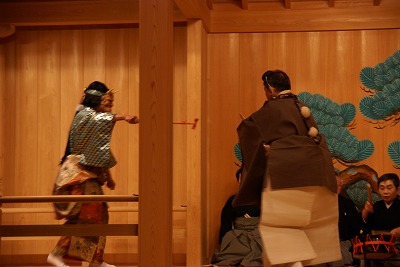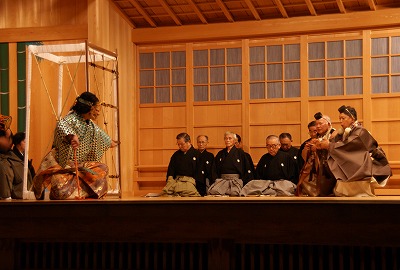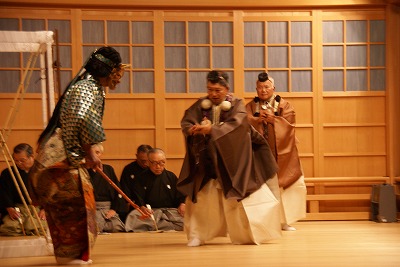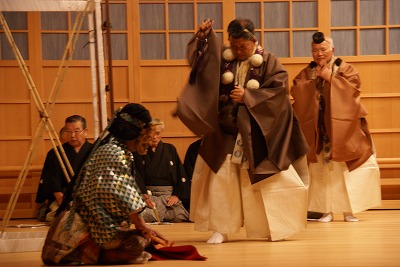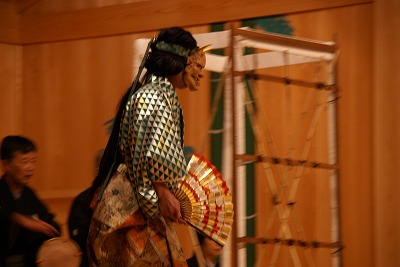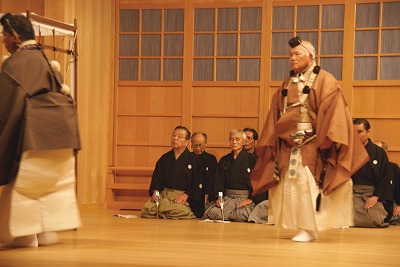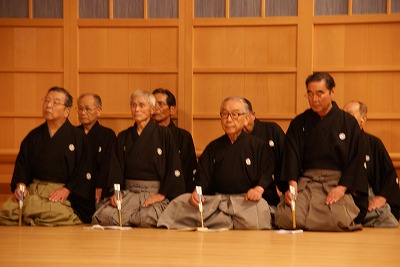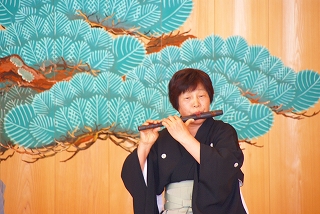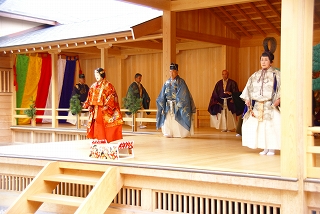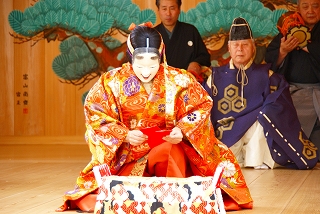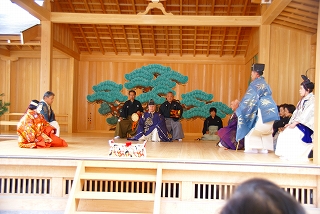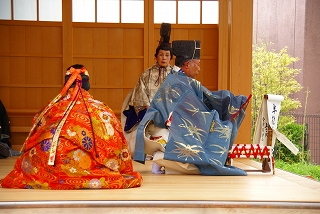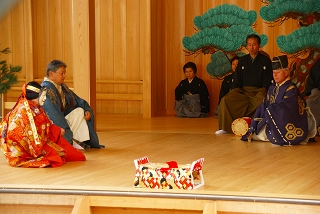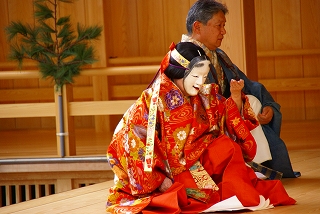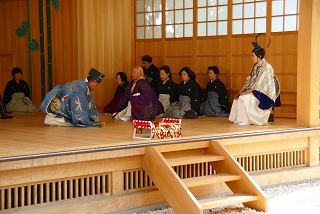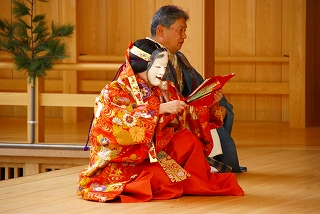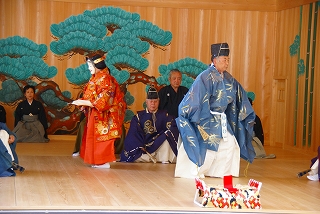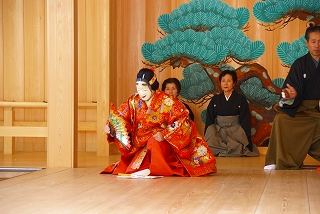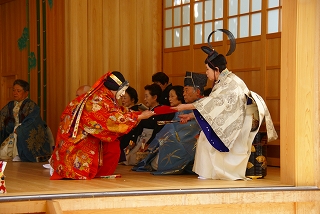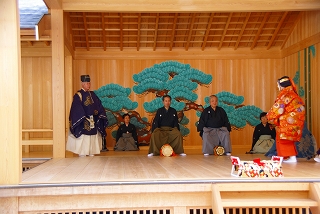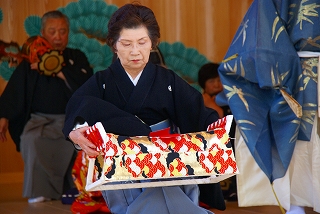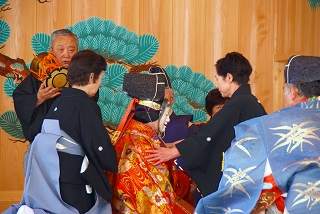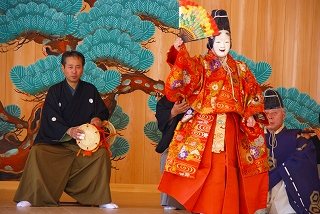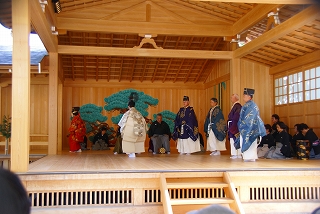平成28年ー秋の「能と謡い」定期公演ー
10月30日(日)午前10時開始、終了午後4時頃 会津能楽堂にて
素謡い、仕舞い、舞囃子が番組順に行われた。観客は最後の演能の頃には150名前後、来場者は番組の配布数200部がなくなったので、そのあたりかと推定される。写真は番組順に掲載
● 経 政 つねまさ Tsunemasa 修羅物、秋、所は京、仁和寺 修羅道とは武士が死後に落ちる地獄の一種で、そこは 永遠に殺し合いが続く苦しみの世界です。
シテ 堀 篤子 ワキ 鈴木圭介 囃子 大鼓 坂内庄一 小鼓 栗城幸子 笛 佐藤 仁
地謡 斎藤 堅 二瓶 晃 長澤 豊 松尾幸生 皆川米作 折笠成美 岩淵健一 渋川兼三
後見 上野正義 山内幸雄
(あらすじ)平家一門の平経政は琵琶の名手であり貴公子である。仁和寺御室の守覚法親王(しゅかくほっしんのう)に寵愛され、「青山せいざん」という琵琶を与えられていたが、「青山」を仁和寺に残し、一門と共に西に向かう途上、一ノ谷の合戦において討たれてしまう。仁和寺では守覚法親王の命により、経政の霊を弔うため管弦講を催します。管弦講の中に若武者姿の経政が現れ、妄執に惹かれて人間世界に戻ってきたことを語る。ワキの行慶が声をかけると、自分は経政だと名乗るが影は幽かで声ばかりが残る。行慶の問いに経政は答え、何不足のない日々を送ったことを懐かしみ、姿は見えないながら「青山」の琵琶を弾く(シテは持ち物として琵琶を持つわけでない。観客は琵琶を弾くシテを思い浮かべなければならない)
経政は俄雨と聞き違える松風の音の中、中国の伝説や近くに見える衣笠山などを思い描きながら琵琶を弾き続ける。心が高揚し経政はカケリを舞うが、突然一ノ谷で討たれた無念の念に襲われる。その恨みの思いがあるために、たちまちに経政は修羅道という地獄に堕ち、阿修羅王の兵と帝釈天や梵天の兵との果てしない戦いに巻き込まれ、激しく戦う。やがて経政は自分のその身を恥じ、暗闇に紛れて姿を消す。
●Tsunemasa. This story is called Shuramono and is the second program. Shuramono(dou ) is one of the hell into which the samurai falls after death, and is the world of suffering to which killing one another continues there through all eternity. The place is Ninna-ji Palace in autumn.
Heike family’s Tairanotsunemasa is an expert of the Japanese lute and is a young nobleman. He was loved by a prince Syukakuhossin, and given a Japanese lute “Seizan”. He deposited Seizan to Ninna-ji temple, and went to the western front with the family because he did not want to lose the rare utensil “Seizan” by the fight. However, he was killed in the battle at Itinotani on the way.
Kangenkou ( a funeral with the stringed instrument) for the soul of Tsunemasa is held in Ninna-ji temple by direction of the prince Syukakuhossin.
Kangenkou continued to midnight,and Tsunemasa of the appearance of a young samurai appears while the shadow is faint. He talks that he returned to the human world for the obsession. Only his voice hears into the faint shadow. He brings up and picks the lute “Seizan” and speaks that he spent satisfied and joyful in this world. He answers that he is Tunemasa when Gyoukei of the Waki post calls him. He keeps playing the lute while imagining,recollecting various scenes, and spends the time of bliss. Suddenly the anger and regret about having been killed by the fight welled up in him. He dances Cakeri before long. Soon he is caught up into an unmeasured fight against Asyura and Taisyakuten’s army and fights violently in the hell named Syuradou. He finds himself changed into an ugly appearance and is ashamed of it. And soon he is diverted to the dark and disappears when daybreak will begin to become near before long.
平成28年 薪能 演目「黑塚」 9月22日 会津能楽堂 ときどき小雨
後シテ 坂内庄一 前シテ 佐藤ヨシカ ワキ 渋川兼三 ワキヅレ 佐藤 仁
囃子 大、船木真一 小 折笠成美 太 長谷川土希子 笛 石田桂子
地 星 英男 白井治男 鈴木圭介 長澤 豊 皆川米作 一条正夫 平山 昇 相田幸三
後見 上野正義 堀 篤子 栗城幸子(囃子後見)
●黒塚は「安達ヶ原の鬼婆伝説」を素材とした作品です。時は秋、所は奥州安達ヶ原。五番目物。
那智の東光坊の阿闍梨(あじゃり)祐慶は、所願成就のため本山の那智を出て諸国廻行の修行に出、一行は陸奥の安達ヶ原にやって来る。日も暮れ宿を取ろうとしますが人家が見えない。その時暗がりの中で遠くに灯りが見えたので、一夜の宿を借りるために立ち寄ると、家には女主人がいて「あまりにも見苦しいので宿を貸すことが出来ない」と応える。祐慶は何度もお願いする。女主人はその都度断るが、あまりにもいたわしく思いとうとう宿を貸し、茅筵で寝床を用意する。祐慶は礼を述べて室内に入るが、片隅に見慣れない道具があるので、「それは何に使う道具か」と尋ねる。女主人は「それは枠かせわと言って自分のように卑しい者が麻を紡ぐための道具だ」と答える。祐慶は「麻を紡ぐ作業を見せてほしい」とお願いする。女主人は「旅人にお見せするようなものではない」と恥ずかしそうに言いながらも、月影が差す部屋の中で糸を繰り始める。糸を繰りながら、女主人が「車が廻れば糸が繰られ、繰り返し繰り返しするだけで尽きることがないように、人の一生も浮き世を巡る物憂さから離れることが出来ないことだ」と涙を流す。そして「糸づくし」と言われる秋の詩情を感じさせる歌を謡い、糸のように細く長い命のつれなさを託ち泣き崩れ、糸を繰るのを止める。女主人は夜寒がつのったので裏の山に薪を採ってくると言い、祐慶に「自分の留守中に決して隣の部屋を覗いてはいけない」と念を押します。女主人が出かけると、祐慶はその禁を破って隣の部屋を覗いてしまう。そこには数え切れないほどの屍が積まれ、おびただしいほどの血が流れていた。祐慶はここは鬼のすみかであったと肝を消し、一行は慌てて逃げて行く。
そのとき、本性を現した鬼女が現れ「決して覗くなと言ったのに約束を破られたこの恨みを晴らさないではおれない。一口で食ってしまおう」と襲いかかる。祐慶は必死の祈りでかろうじて鬼女を調伏する。やがて鬼女はすさまじい声を残して姿を消す。
見所は、前段の糸を繰りながら秋の情趣をしみじみと謡い人生のつれなさを嘆く「静」の場面と、後段の祐慶と鬼女の対決、恨みを晴らせないまま次第に調伏されていく鬼女の悔しさを表現する「動」の場面にある。(文責 山田和彦)
●Krozuka
Noh Krozuka is a work made from Adatigahara hag legend. The place is Adatigahara in autumn ( current Fukushima Prefecture). A Buddhist monk of Nati ( current Wakayama Prefecture), Ajyari Yuukei and his followers go out to the travel for the purpose of the training and praying buddhist temples.
The day grew dark, when they arrived at Adatigahara(wasteland) on the way of the travel. They try to take the hotel but there is not a house either. They find a light far away, and go to borrow the lodging for one night. There is a mistress in the rude house and she refuses their offer ,saying that “It is not possible to lodge because here is too unsightly ” When Yuukei appeals her for the lodging many times, at last she approves the lodging. She prepares the bed with Kayamusiro (a kind of the carpet that is knited from the grass ). He finds a strange tool to the corner of the room, and he asks her , “Is this a tool used for what?” She answers. “It is called Wakukasewa. It is a tool for a person as poor as me to spin hemp” She begins to turn the string in the room that the moonlight opens. She mutters while turning the string, and throws tears. “While the spining wheel is turned, the string never stop turning. Human being cannot apart from the worldly dull and gloomy as like as the string” She chants the song that makes the poetic sentiment of autumn, and grieves for a thin,long life like the string. She stops the spining finally.
Because it becomes cold night , she says that I will take the firewood from the hillback. “Don’t peep into a next room in my absence” However, he breaks the prohibition, and peeps into a room after the woman goes out.
A lot of corpses were piled up there, and the stream of the blood were vast all over the floor. He learned that the demon lives in this rude house. They are terrified and they run away. She becomes demon’s appearance because the secret was exposed by him. You violated the promise although I told that you must not to peep into her room. “It is impossible that my grudge is not dispelled. I will eat you at a stretch”. She attacks them fiercely. When he recites desperately the Buddhist scriptures, the magic of the ogress has gradually becomes weak. The ogress left a terrific voice and will disappear before long.
The viewpoint of the former steps is a scene of “Quietness”; the woman grieves for an empty,bitter life while turning over the string. The viewpoint of latter part is a scene of confrontation “Movement”between Yuukei and the ogress. The scene expresses mortifying gradually cursed without working off a grudge of the ogress.(by ksk)
平成28年 春の演能 演目「草紙洗」
「能」のあらすじと解説 季節は夏。場所は前半が小野小町邸、後半は宮中。三番目物
宮中で行われる歌合に、大伴の黒主の相手は既に小野小町と決められていました。黒主はとうてい小町にはかなわないと思い、予め小町の歌を知るために小町邸に忍び込みます。そうとは知らず、小町は明日の歌合わせで詠出する予定の題詠歌「水辺の草」を口ずさみます。黒主はそれを聴き、手持ちの『万葉集』の写本の歌の間に「作者不詳」としてその歌を書き入れます。(前半は省略)
宮中では歌人の並み居る中で小町の歌が詠まれ、帝は小町の歌に勝る歌はないだろうとおっしゃると、黒主が異議を唱え、小町の歌は『万葉集』に既に詠まれていると言って、証拠として『万葉集』を提出します。『万葉集』を辿って行くと夏の部に小町が提出した歌がはたして記載されていました。小町は歌人としての品格が否定され悲しみに沈みますが、証本の万葉集を見ると自分が盗んだとされた歌の行の乱れと、墨の色が他と違う事を見いだし、黒主が小町の歌を盗み聞きした後書き加えたものではないのかと怪しみ、この草紙を清らかな水で洗いたいと申し出ます。上奏役の紀貫之はもし水で洗ってその歌が消えなかったら、いっそう不面目となろうと言います。小町があまりにもうちひしがれて退出する姿を見て貫之は小町を止め、帝に草紙を洗う許可を取り次ぎます。帝は許可し、小町は草紙を水で洗います。洗うと他の歌はそのままなのに、自分が盗んだという歌は跡形もなく消えてしまいます。小町は喜びの中に、帝に草紙を提出します。
一方、自分の企てが露見した黒主は、もはやこれまでと思い自害しようとします。小町はそれを押しとどめ、黒主の行為は歌道を嗜む熱心さから起きたことだと寛容を示し、帝も道に熱心のあまりであるとして許します。歌人達は、一人は疑いが晴れ、一人は熱心さのあまりとして許されためでたさに、小町に帝の御前で舞を舞うように勧めます。花の薄衣に風折烏帽子を身に着けた小町は美しく舞い納めます。
解説
登場する歌人達は何れも『古今和歌集』の歌人ですが、小町と黒主は同時代でも紀貫之等は別時代の人であり、また「道」の概念は中世に確立するところからも、このエピソードは史実ではなく、『古今和歌集』の仮名序を素材としたフィクションだと考えられます。
主題は「和歌の道こそめでたけれ(和歌の道に熱心であることは優れて価値が有る)」というものですが、観客の興味は前半で黒主が観客に告白した卑劣な企みが、後半の歌合の場でどのように展開し、小町は自分にかけられた嫌疑をどのように乗り越え、事態がどう納められるのかに置かれます。まさしく緊張感のあるドラマです。また、草紙を洗う場面は和歌集の部立(『万葉集』ではなく、『古今和歌集』)に従って謡い進めて行くのですが、それは古典の文言をちりばめた聞かせ所であり、さらに不安の気持ちを隠して草紙を洗う小町の姿は美しい絵になる所でもあります。最後は嫌疑が晴れて喜びの中に「中之舞」を舞い、「キリ」を舞い、「和歌の道こそめでたけれ。」という主題で収めます。
能『草紙洗』は小野小町の登場する能では最も若い小町であり、また歌人としての生身の姿が生き生きと表現されている曲だと言って良いでしょう。 (文責 山田和彦)
Soshi-Arai
Synopsis
During the 9th century of the Heian Era, Otomo no Kuronushi (waki) and Ono no Komachi (shite), both among the “Six Poetic Geniuses” of the time, are set to compete against each other in a poetry contest at the imperial palace.
Kuronushi is sure he will lose because Komachi`s skill is greater. So, he sneaks into Komachi`s house. Komachi is at home composing a poem based on the contest topic, “water grasses.” Kuronushi eavesdrops and steals her poem.
Kuronushi`s plan is to insert Komachi`s poem into the “Man`yoshu”(an anthology of 4,500 poems compiled around 759 AD) and accuse her of plagiarism. And so, he waits for the contest to begin on the following day.
(Interval)
The day of the contest, the greatest poets of the era have gathered before the Emperor. It is a spectacular display of courtly elegance. The reading of poems begins. Komachi`s poem is chosen first. Kuronushi objects and presents the copy of the “Man`yoshu” he has prepared as evidence. He says Komachi copied an old poem. Alarmed by this sudden accusation, Komachi defends herself at all odds. She notices that the black ink of the stolen poem is newer than the rest of the book. She requests to wash the book in clean water. The courtier, Tsurayuki, says that if the book is washed and the ink doesn`t fade, it would be a disgrace. Upset and overcome by shame, Komachi attempts to leave. But, Tsurayuki speaks to the Emperor, who decrees that he will forgive the washing of the book.
Then, Komachi washes the book in a golden wash tub. The ink of the old poems does not fade. However, the new ink Kuronushi used to write the stolen poem is completely washed away. Kuronushi`s trick is uncovered and Komachi is proven innocent.
In this turn of events, Kuronushi becomes ashamed and decides he has no choice but to commit suicide. Komachi stops him and says his actions were caused by an enthusiasm that is essential to the art of poetry composition. The emperor agrees with Komachi and forgives Kuronushi. The gathering of poets is glad Komachi`s name has been cleared and Kuronushi`s devotion to the art of poetry has been forgiven. In a flowered robe and courtier`s cap, Komachi dances before the court in celebration of peace and the virtues of poetry.
Commentary
This play may be referred to as “gendai noh”(realistic). All the poets who appear are in the “Kokinwakashu,” (or “Kokinshu”) which is an anthology compiled around 920 AD. It covers about 140 years of court poetry arranged by topic (e.g. seasons, congratulations, love, travel, laments). Komachi and Kuronushi lived during the same time period, but Ki no Tsurayuki (one of the four compilers) lived fifty years later. This means that the events of this play are probably fictional. The theme is “When the poet is ardent, the art of poetry is superior.” The audience`s interest is captured by the suspenseful drama of Kuronushi`s crafty plan and how Komachi clears herself of suspicion. The scene in which she washes the book is a particular highlight of this play. With joy, she performs chuunomai (a medium tempo dance) and kiri (a faster tempo closing dance). By ksk
